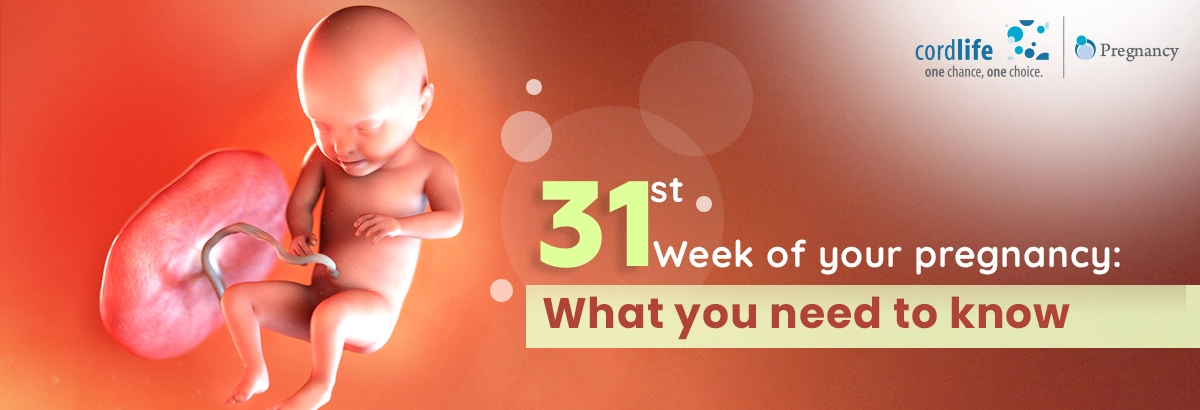Table of Contents
It’s the 31st week of your pregnancy! Wow! You’re almost there! Only 9 weeks left for you to hold your little champ in your arms. So, while you feel excited to count your days, see what you can expect from your baby and your body.
Explore Your Baby Inside
The 31 weeks foetus is about the size of a tender coconut, weighing around 3 3/4 pounds (1,707 grams), and measuring not more than 11 inches (28.3 cm) from the top of the head to the bottom of the buttock (also known as crown-rump length). That’s not all!
The Baby’s Brain Starts Developing Rapidly
Yes! The foetal brain at this stage is growing at a rapid pace. Faster than ever! After all, the individual nerve cells in your baby’s brain are connecting, forming millions of them, and further helping your baby develop all five senses. The baby inside may be processing information, the irises can respond to light (As a little light shines on the belly), and he or she may be able to taste and smell the food that you eat from the amniotic fluid, slightly. Who knows the baby may be able to catch a whiff of a beauty product you may be using.
The Eyes See and Blink
As you undergo ultrasound scans this week, you will notice that your little one’s eyes are developing. He or she will be able to see some faint shapes. Research has further shown that your little champ inside will also be able to blink approximately 6 to 15 times in an hour as compared to the adults.
The Lungs Continue to Mature
Your little one might be able to smell a little as it has been mentioned before. But your baby is still picking up on the breathing technique, as your baby’s lungs are still at a developing stage.
Fat will start accumulating underneath the skin of your developing baby, and he or she will add on to the pounds until such time that the child makes his or her way out of the womb. Besides that, too, your little champ will make you feel that he or she is busy, active, and healthy by moving in several ways – by stretching, pedalling with his or her little hands and feet, and sucking the thumb.
Isn’t that fun? ?
Explore Your Body From Outside
While you’re noticing and monitoring every movement of your child inside you, notice that your belly (uterus) has grown quite a lot and is gradually paving its way toward labour. Along with this, expect some more changes across your body. So, here are some of the symptoms for the 31st week of your pregnancy:
Leaky Breasts
The breasts grow and start preparing milk for the baby after his or her birth. Some of you start making milk as early as the 16th week of your pregnancy – the breasts start leaking out of the nipples while you’re in the second trimester, and breast discharge or leakage is most common during the third trimester. So, if you notice yellow or orange fluid on or around your nipples, you needn’t worry or feel shy about it. That’s the colostrum, also known as “foremilk” – a nutritious and perfect first food, essential for your newborn’s development and that is perfectly normal. Wear a supportive bra and tuck in nursing pads to protect your clothes from stains.
Shortness of Breath
Before the baby turns and drops farther down into the pelvis, the foetal head is under the rib and presses on the diaphragm. This can make your breathing difficult during this stage of your pregnancy. Eat small, space out your meals evenly, and sleep on your left side to breathe properly.
Frequent Urges to Visit the Washroom
Frequent urination is most common during the early stage of pregnancy, it might, however, reappear in the later part when the baby and the uterus grow together and exerts pressure on the bladder.
Back Pain
With the hormonal changes and expansion of the uterus, your centre of gravity shifts and the muscles of your abs stretch, thus straining your back. Expect lumbar back pain and posterior pelvic pain as a result. Do some low–impact exercises like brisk walking and swimming to reduce your back pain. You can also go for a prenatal massage.
Feeling Sleep–deprived at Night
Another woe arises out of hormonal changes, as well as pregnancy anxiety, frequent urination, leg cramps, back pain, heartburn, and constipation. Listen to soft music, dim the lights of your room, try to sleep on your left side, and enjoy a peaceful slumber with a pregnancy pillow.
Feeling Braxton Hicks Contractions
If you haven’t already felt the occasional tightening of the ab muscles, you may start feeling them now. These are known as Braxton Hicks contractions and tend to increase in intensity. Learn the right breathing technique in your antenatal classes to deal with it.
Need More Information About Cordlife Stem Cell Banking?
Book a FREE Presentation Now
During this time all that you need to focus on is your diet, drink plenty of water, keep a check on your baby’s movements, and don’t forget to plan to bank your baby’s cord blood.
